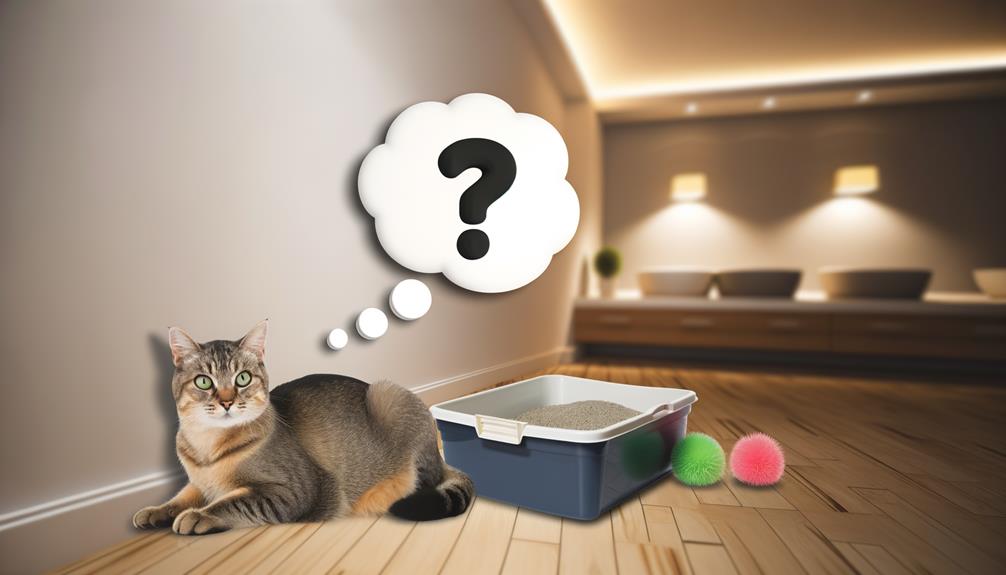You've probably noticed your cat meowing after using the litter box and wondered why. While it might seem like a quirky habit, there are several reasons behind this behavior. Your feline friend could be feeling a sense of relief, seeking your attention, or signaling a problem with the litter box itself. Sometimes, it could even be a sign of underlying health issues or environmental stress. Understanding these nuances can help you guarantee your cat's well-being and comfort. Curious about what might be going on with your furry companion?
Common Reasons for Meowing
Cats may meow after using the litter box for several common reasons, each reflecting a different aspect of their well-being and communication needs. Understanding these reasons can help you address your cat's specific requirements and guarantee their comfort.
Firstly, a cat may meow post-elimination to express relief, particularly if they experienced prior discomfort. This vocalization can be attributed to digestive issues or urinary tract problems. If your cat consistently shows signs of discomfort, a vet check is advisable to rule out any underlying health problems.
Another reason your cat meows after using the litter box could be a desire for attention or a reward. Cats often use vocalizations as a communication signal to their owners, indicating successful use of the litter box. This behavior can be reinforced if you respond with praise or treats, thereby encouraging continued vocalization.
Hygiene preferences also play a significant role. Some cats meow to signal dissatisfaction with the litter box's cleanliness or the quality of the litter itself. Maintaining a clean litter box is essential, as many cats are particular about their hygiene and may demand immediate attention if their litter box is not up to their standards.
Individual cat breeds exhibit varying vocalization patterns. Breeds known for their vocal nature, such as Siamese or Bengal cats, may be more prone to meowing after using the litter box as part of their inherent communication style. Understanding your cat's breed-specific traits can provide further insight into their behavior.
Health Issues to Consider
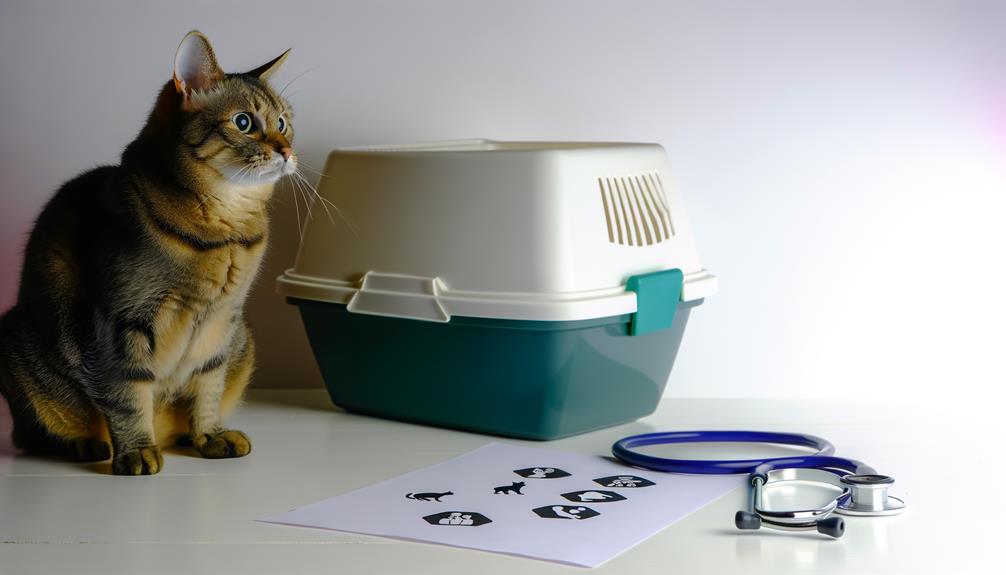
Increased vocalization after using the litter box often indicates discomfort or pain, necessitating close attention to potential health issues. When cats consistently meow post-elimination, it's important to take into account various medical issues that could be causing this behavior. One common culprit is urinary tract infections (UTIs) or feline lower urinary tract disease (FLUTD). These conditions can make urination painful, prompting your cat to vocalize in distress.
Gastrointestinal distress is another significant factor. If your cat is constipated or having difficulty defecating, it may meow due to the associated discomfort. Gastrointestinal issues can range from minor to severe, so it's vital to monitor any changes in your cat's bowel movements and overall behavior.
Anal gland issues also merit attention. These glands can become impacted or infected, causing pain during or after defecation. This discomfort can lead to noticeable vocalizations. Regular check-ups with your veterinarian can help identify and address these problems before they escalate.
For senior cats, increased vocalization after using the litter box might be linked to cognitive decline. Older cats can experience confusion or anxiety, which might manifest as increased meowing. Monitoring these behavioral changes and discussing them with your veterinarian can provide insights into your cat's underlying health.
Ultimately, regular veterinary check-ups are essential. Persistent post-litter box vocalization should prompt a medical evaluation to rule out serious health concerns. By staying vigilant and seeking timely veterinary advice, you can guarantee your cat's well-being and address any medical issues that may be causing discomfort.
Behavioral Factors
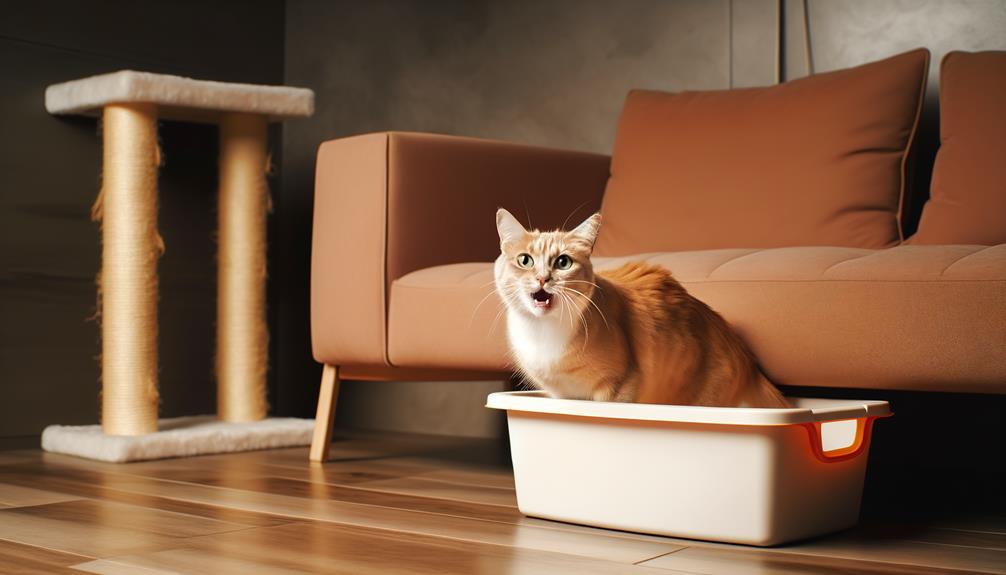
Post-litter box vocalization can often be traced to various behavioral factors that go beyond mere physical discomfort. One common reason your cat might meow after using the litter box is to communicate the completion of the task. This form of vocalization can be an expression of relief or satisfaction following elimination. It's normal for some cats to exhibit this behavior, as individual vocalization patterns vary by breed and personality.
Another significant factor is positive reinforcement. If you, as a cat owner, often respond to your cat's meowing with attention or treats, the cat might associate meowing after using the litter box with receiving these rewards. This can condition the cat to vocalize more frequently in an attempt to seek similar responses.
However, meowing can also indicate discomfort or pain. If your cat's vocalization seems excessive or distressed, it could be a sign that something is wrong, such as underlying health issues like urinary tract infections or constipation. Monitoring for additional symptoms and consulting a veterinarian is advisable to rule out medical concerns.
Environmental changes can also play a role. While this is more relevant to the next subtopic, it's worth noting that any alterations in your cat's routine or surroundings can heighten anxiety, which may lead to an increase in vocalization post-litter box use.
Understanding these behavioral factors helps cat owners discern whether their cat's meowing after using the litter box is a normal part of their communication or indicative of a deeper issue requiring attention.
Stress and Environmental Changes
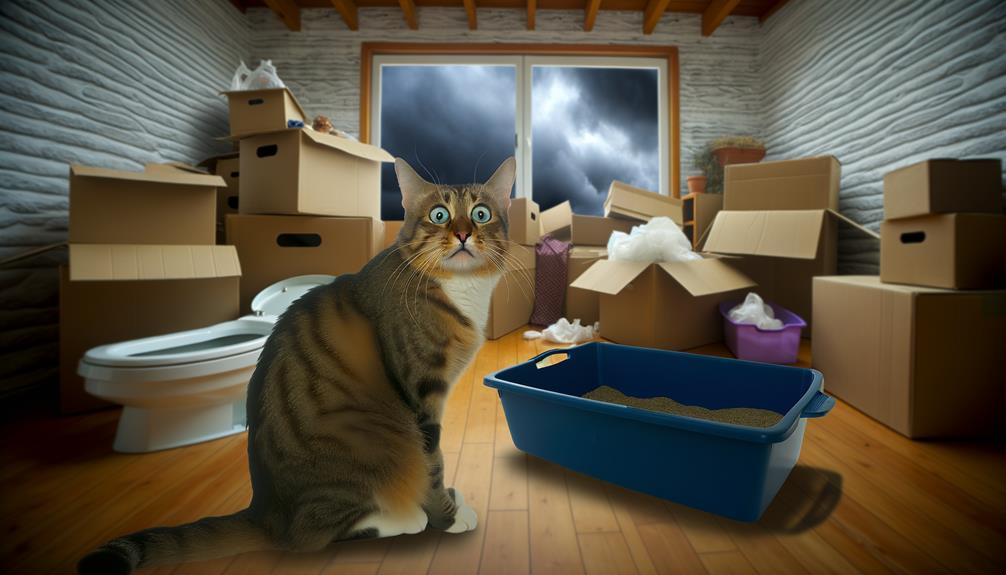
Environmental stressors can greatly impact a cat's behavior, including their vocalization patterns after using the litter box. Changes in household dynamics, such as the introduction of new pets or people, often lead to increased stress in cats. This stress can manifest through meowing after using the litter box as a form of communication. Your cat might be trying to express discomfort or anxiety, especially if they perceive the area as unsafe or if their routine has been disrupted.
| Stressor | Impact on Cat |
|---|---|
| New Pets or People | Increased anxiety, vocalizations post-litter box |
| Loud Noises | Heightened sense of vulnerability |
| Changes in Home Layout | Disrupted routine, need for reassurance |
Environmental changes, such as loud noises or alterations in the home layout, can contribute to your cat's feeling of vulnerability while using the litter box. This sense of insecurity often leads to vocalizations post-elimination. Your cat may meow after using the litter box to signal a need for reassurance or to communicate feelings of insecurity in response to these recent changes.
Monitoring your cat's vocalizations and behavior during periods of stress is essential. By doing so, you can identify specific triggers and promote a more stable environment to reduce anxiety-related meowing. It's important to remember that your cat's vocalizations are a form of communication. They might be trying to tell you that they don't feel safe or that something in their environment has changed, increasing their stress levels.
Tips for Cat Owners
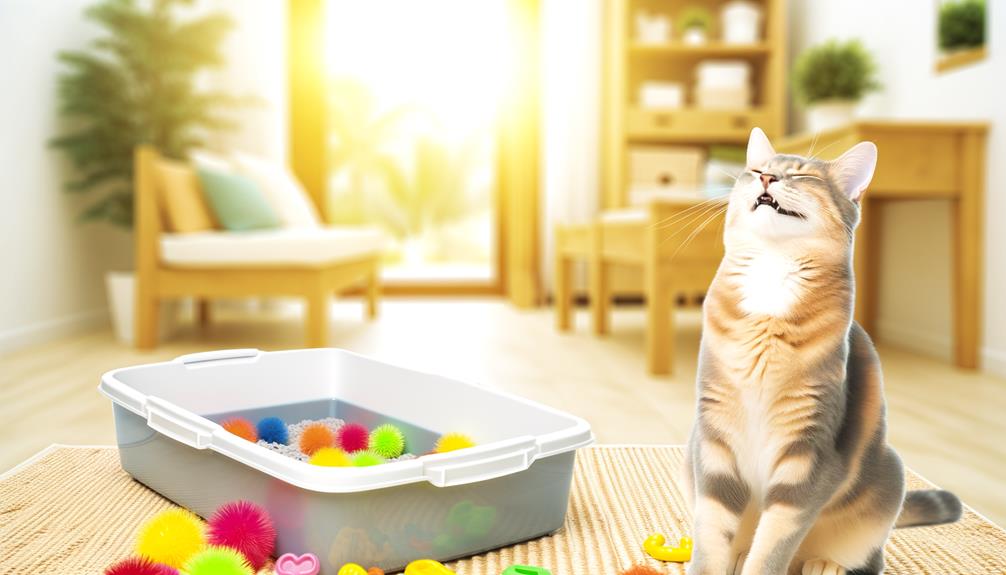
Guaranteeing your cat's well-being involves several practical steps that can help minimize meowing after using the litter box. First, maintain a clean litter box. A dirty box may provoke your cat to meow and even lead to reluctance in using it. Regular cleaning guarantees your cat has a comfortable and sanitary place to go.
Observing your cat's vocal patterns around litter box use is vital. If your cat has always been quiet but recently started meowing, it could indicate discomfort or pain, signaling a need for a veterinary check-up. Conditions like urinary problems or bladder stones can make your cat meow to communicate distress. Early detection is key to managing these health issues effectively.
For multi-cat households, provide multiple litter boxes in different locations. This decreases territorial disputes and minimizes stress-induced meowing. Each cat going to a separate litter box can prevent conflicts and guarantee they have a private space.
Engage your cat in regular playtime or enrichment activities. This helps fulfill attention needs and can decrease excessive vocalization after litter box use. A stimulated cat is less likely to meow excessively for attention.
Monitor your cat for signs of stress or anxiety related to environmental changes. Increased vocalization can be a response to stress. Providing safe spaces for your cat to retreat to can help mitigate this issue. Whether your cat is adjusting to a new home or dealing with other changes, a secure environment can reduce stress-related meowing.
